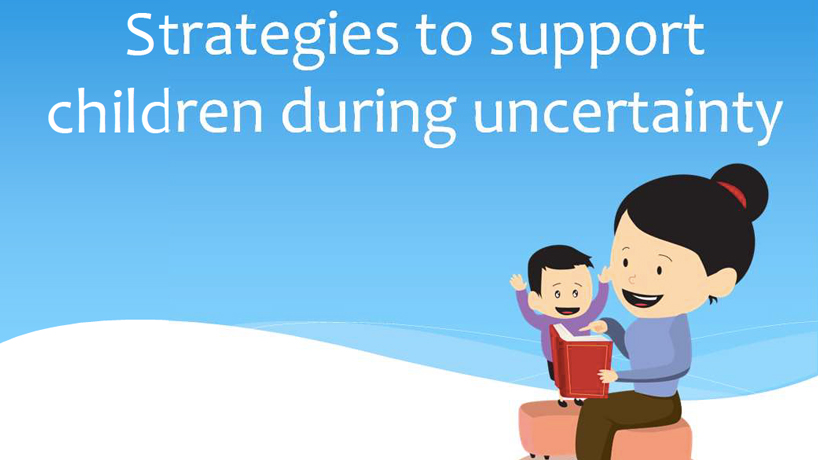
Amy Escott and Matt Kliethermes from Children’s Advocacy Services of Greater St. Louis hosted a webinar Thursday with helpful information to help children amid the uncertainty brought on by the COVID-19 pandemic. (Image courtesy of Children’s Advocacy Services of Greater St. Louis)
The routines of everyday life have been put on pause by the COVID-19 pandemic, and for children that’s meant no bus rides to school, sports team practices or scout meetings and uncertainty over when they might next get to play with their friends.
It can be challenging for parents to know how to talk to and support their children, especially as they’re dealing with their own sense of upheaval.
Children’s Advocacy Services of Greater St. Louis, an affiliate of the University of Missouri–St. Louis, provided some guidance Wednesday during a free webinar held for more than 250 registered viewers that is now available to watch here.
Amy Escott, who serves as the project director for CASGSL’s Missouri Academy for Child Trauma Studies, and Matt Kliethermes, CASGSL’s training director and a faculty member in UMSL’s Department of Psychological Sciences, led the presentation.
“It is normal and it’s appropriate for all of us to be feeling uncertainty or anxiety or fear,” Escott said. “But that doesn’t prevent us from being courageous and really working together to do right by children.”
They stressed the importance of talking to children in developmentally appropriate ways about the situation and giving them accurate information.
Escott began by laying out some facts about the novel coronavirus and the respiratory disease COVID-19 responsible for the pandemic, including that there is not currently a vaccine for the virus, that children appear to be less affected by COVID-19 than adults and the best ways to reduce the spread of the virus include keeping those who are sick away from others and promoting healthy hygiene.
She provided a script that parents might adapt as they try to reassure children while educating them about the current situation and how they can help by washing their hands and staying at home.
“It’s helpful to sort of conclude with something like, ‘There’s a lot going on and a lot of things might be different than usual, but your job is to play and learn and have fun, and you can ask me any questions that you have about coronavirus,’” Escott said. “We really want to be direct with children that we want them to come to trusted adults for information.”
For older children, it’s important to make sure they receive information targeted to their age including about the status of the outbreak and how the virus is contracted. Be forthcoming about the dangers can help protect teenagers who might not want to follow social-distancing guidelines or don’t think the disease is something that poses a risk to them.
It’s important for parents to manage their own anxiety and worries before talking to children of any age so not to overwhelm them, and while there might be an urge to tell them everything will be OK, it’s important not to overpromise.
“Obviously, this is a stressor the size of which we as a country maybe haven’t faced since possibly September 11 or something like that,” Kliethermes said. “When we’re faced by those stressors, I think sometimes we can lose sight of just how kids, in particular, are impacted by stressors. It’s helpful to pass on to adults who are caring for children and let them know that actually most kids bounce back from stressors.”
He noted research suggesting that about 70 percent of children can heal on their own from the types of stresses they’re experiencing today. Another 20 percent might requires brief, supportive interventions. The remaining 10 percent could require more intensive trauma-focused services.
Kliethermes offered some coping strategies, including finding ways to maintain social connections, and the importance of re-establishing routines.
“Even though they often push back against structure, we all know that, in truth, kids really, really thrive on structure and routines,” Kliethermes said. “Structure and routine lead us to having a sense of control, having a sense of things being predictable, and those are probably the two biggest variables that help us increase a sense of capacity for dealing with stress. The more controlling routines we have, the more comfortable we tend to feel.”
Viewers learned some of the stress responses to look out for in children of different ages and when they should seek mental health help, which includes reactions that interfere with home behaviors, acts of self harm, significant difficulty falling asleep or waking up in the middle of the night, frequent nightmares or frequent physical symptoms – including stomach aches or headaches – that don’t have a medical cause.
“All of these would be times to suggest that that stress load that we talked about earlier is overwhelming their capacity to cope,” Kliethermes said.
In the course of approximately one-hour webinar, Escott also shared some helpful phone numbers for area health services as well as websites – including the CDC, PBS and Childmind.org – where adults can find more information on ways to support children.














